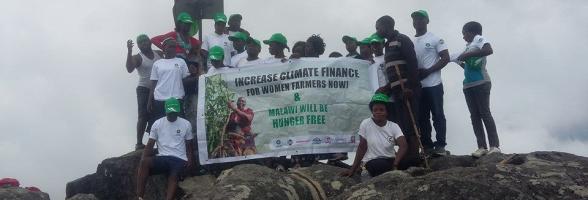A CALL FOR GENDER-RESPONSIVE CLIMATE FINANCING FOR KEY SECTORS, PRIMARILY AGRICULTURE
At the 2024 5th Africa Climate Talks (ACT5) in Addis Ababa, Ethiopia, stakeholders discussed the urgent need for African governments to advance a gender-responsive climate financial ecosystem, especially in the agricultural sector. Oxfam and the African Women’s Development and Communication Network (FEMNET) hosted a side event that brought together representatives from the governments of Kenya, Nigeria, Burkina Faso, Ethiopia and Nigeria, Civil Society and Women’s Rights Organizations.
Africa's agricultural sector, which relies heavily on women's labor’ is facing disruptions with women struggling with decreased yields and resource scarcity, making farming more laborious. Climate change, worsened by unpredictable weather patterns exacerbates the situation further forcing women to travel long distances for water and firewood This leaves less time for farming and income generation activities.
This crisis also worsens existing inequalities increasing care burden for women as family members become sick or displaced by climate shocks. The COVID-19 pandemic further intensified these challenges, with women reporting a rise in gender-based violence as tensions rose within strained households.
“Amidst the devastating effects of climate change crisis in the region, I see hope in the unwavering resilience of the African spirit particularly the African woman. They are the backbone of the agricultural sector, the nurturers of our families, they are also the guardians of our environment. Despite this, they are disproportionately burdened by the effects of a crisis they did little to create” said Jeffrey Maganya, Oxfam in Africa Interim Programs and Influencing Director, during his opening keynote.
The discussions at the event centered around three key messages:
- A climate localization agenda: Panelists, including representatives from Women's Rights Organizations (WROs), argued that traditional climate finance mechanisms often exclude them. They called for a system that empowers WROs to access resources and support women-led climate initiatives at the community level. The call-to-action urged African countries to advocate for a clear climate localization agenda that allows for grassroot women to have access to financing.
- Increased funding for African research with a gender perspective also took centre stage during the discussions. This research will be crucial for developing solutions that address the intersectional needs and vulnerabilities of women, children, youth and persons living with disability.
- Noting that Africa has fallen short of its financing targets, participants discussed holding the private sector accountable, calling for the development of an accountability frameworks that ensures private sector funding support climate initiatives that benefit women in key sectors like agriculture.
Data presented at the talks highlighted the disproportionate impact of climate change on women. Oxfam in Ethiopia shared findings from research on the small-scale female food producers. The research highlighted the challenges such as climate, COVID 19 pandemic, locust infestation and conflict which compounded their situation. Mulu Wase Gle, an Ethiopian female farmer, described how women play a critical role as producers but have limited access to education, social-services and finances; urging the global community to recognise their critical role and invest in the contributions of local women to lighten their burdens.
The event at the 5th Africa Climate Talks which was also attended by organizations like the Network of Ethiopian Women Associations (NEWA), the African Group of Negotiators, SEND Ghana, the SDG 2 Hub, and the African Women and Gender Constituency concluded on a high note with a renewed commitment towards building movement around the formulation of a gender-responsive climate action.
“Stand up and stand out. Not “if” and not “when”. Not for women but with women.” declared Dr. Gezahegn Kebede, Country Director, Oxfam in Ethiopia in a meticulously crafted poem composed expressly for this purpose, emphasizing that a gender-responsive climate finance ecosystem for the continent must be accorded the urgency it deserves.
The discussion and recommendation at the Oxfam and FEMNET hosted event have been incorporated into the final declaration of the African Regional Forum on Sustainable Development (Addis Ababa Declaration 2024). These primarily include:
1. The adoption of tested models in climate financing (particularly climate risk insurance). Ref clause 37 (a)(i)
2. Deliberate mobilisation of private sector financing to deliver transformative climate action. Ref clause 37 (a) (iii).
3. The need for a conscious advancement into an Afro-centric evidence-based climate localisation agenda. Ref clause 37 (a)(viii)
4. Investment in gender responsive climate policies, primarily targeting the agricultural sector. Ref clause 48 (a) (iii)
5. Improved collaboration amongst key stakeholders (particularly government - private sector partnerships) for transformative agricultural policies. Ref clause 49. (b)
These insights will help shape the positions of African countries leading up to and during the twenty-nineth Conference of Parties, which will be held in Baku, Azerbaijan, from 11 to 22 November 2024.
Authored by Diana Moraa, TAP 2 Comms Consultant and Fatuma Noor, Media and Communications Advisor, Oxfam in Africa, with the support of Wanjiku Margaret Wanjohi, Senior Gender Advisor, Oxfam in Africa.
